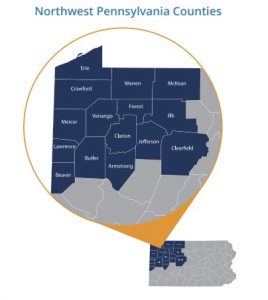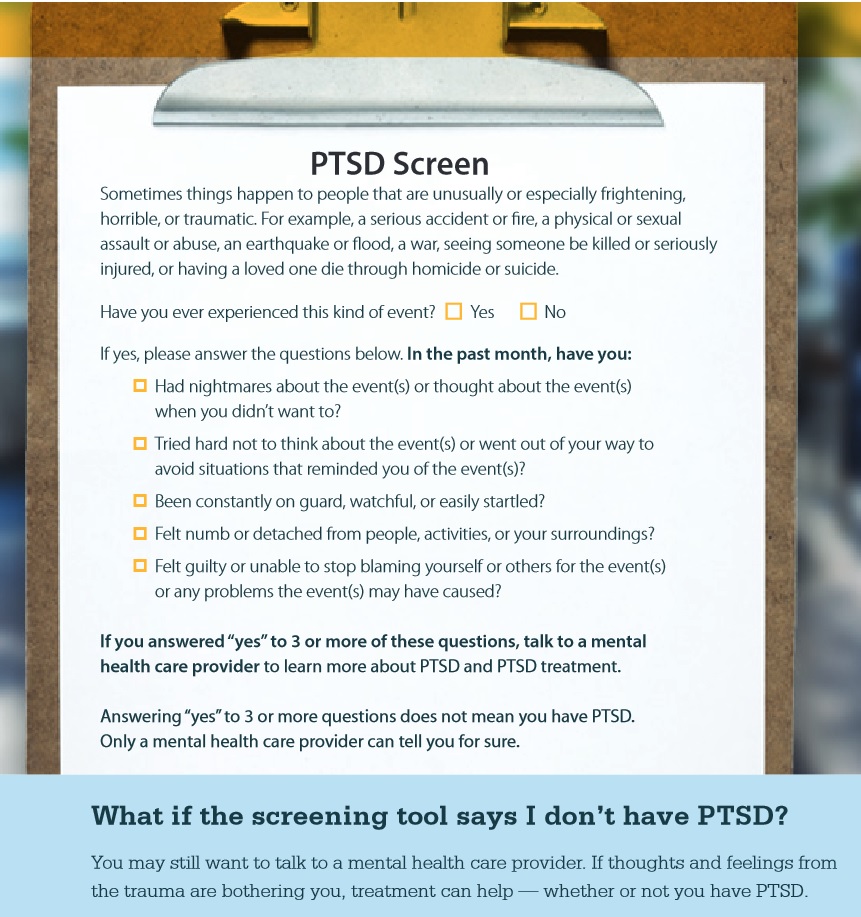 The Northwest Pennsylvania (NW PA) Veteran Suicide Prevention Program operates on a three-pronged approach involving healthcare providers, community organizations, and Veterans and their families in the 15 counties of NW PA. Because of this focus, we want to share this information from the U.S. Department of Veterans Affairs about the effectiveness of treatment for post-traumatic stress disorder (PTSD). As June is PTSD Awareness Month, sharing information about confidential mental health services for Veterans helps to save lives and promote resiliency and well-being.
The Northwest Pennsylvania (NW PA) Veteran Suicide Prevention Program operates on a three-pronged approach involving healthcare providers, community organizations, and Veterans and their families in the 15 counties of NW PA. Because of this focus, we want to share this information from the U.S. Department of Veterans Affairs about the effectiveness of treatment for post-traumatic stress disorder (PTSD). As June is PTSD Awareness Month, sharing information about confidential mental health services for Veterans helps to save lives and promote resiliency and well-being.
If you have any questions or would like to speak with someone about publicizing the NW PA Veteran Suicide Prevention Program in your community, please reach out to us.
Read time: 3 minutes
Learn more about PTSD and effective PTSD treatments on the VA website.
PTSD Treatment Works
Even though PTSD treatments work, many people who have PTSD don’t get the help they need. Everyone needs to know that treatments work and can lead to a better quality of life.
What is PTSD?
PTSD (posttraumatic stress disorder) is a mental health problem that some people develop after experiencing or witnessing a life-threatening event, like combat, a natural disaster, a car accident, or sexual assault. It’s normal to have upsetting memories, feel on edge, or have trouble sleeping after this type of event. At first, it may be hard to do normal daily activities, like go to work, go to
school, or spend time with people you care about. But most people start to feel better after a few weeks or months.
If it’s been longer than a month and you’re still having symptoms, you may have PTSD. For some people, PTSD symptoms may start later on, or they may come and go over time. Here’s the good news: you can get treatment for PTSD — and it works. In this booklet, you’ll learn about types of treatment that are proven to help. For some people, treatment can get rid of PTSD altogether. For others, it can make symptoms less intense. Treatment also gives you the tools to manage symptoms so they don’t keep you from living your life. PTSD treatment can turn your life around — even if you’ve been struggling for years.
Trauma can take many forms.
A traumatic event could be something that happened to you, or something you saw happen to someone else. Seeing the effects of a horrible or violent event can also be traumatic — for example, being a first responder after a terrorist attack.
How do I know if I have PTSD?
The only way to know for sure is to talk to a mental health care provider. They will ask you about your trauma, your symptoms, and any other problems you have. If you think you might have PTSD, answer the questions in the screening tool below.

What do I do if I have symptoms of PTSD?
After a traumatic event, it’s normal to think, act, and feel differently than usual — but most people start to feel better after a few weeks or months. Talk to a doctor or mental health care provider (like a psychiatrist, psychologist, or social worker) if your symptoms:
+ Last longer than a month
+ Are very upsetting
+ Disrupt your daily life
+ Treatment can help — you CAN get better.
You’re not alone.
Going through a traumatic event is not rare. At least half of all Americans have had a traumatic event in their lives. About 7 out of every 100 Veterans (or 7%) will have PTSD at some point in their lives.
Where can I go to get help?
If you’re a Veteran, check with the VA about whether you can get treatment there. Visit http://www.va.gov/directory/guide/PTSD.asp to find a VA PTSD program near you. If you’re looking for care outside the VA, ask your doctor for a referral to a mental health care provider who specializes in PTSD treatment, or visit https://findtreatment.samhsa.
gov/ to search for providers in your area.
Looking to Get Involved?
 Whether you identify as a healthcare provider, community organization, or Veteran, there are several opportunities through the NW PA Veteran Suicide Prevention Program and PERU to connect to resources, participate in educational training, and promote harm reduction strategies. We are actively recruiting healthcare and community partners to work with us in meeting our goals and objectives. To learn more, visit the program website at theresilientveteran.org.
Whether you identify as a healthcare provider, community organization, or Veteran, there are several opportunities through the NW PA Veteran Suicide Prevention Program and PERU to connect to resources, participate in educational training, and promote harm reduction strategies. We are actively recruiting healthcare and community partners to work with us in meeting our goals and objectives. To learn more, visit the program website at theresilientveteran.org.
Need Help? Know Someone Who Does? Contact the National Suicide Prevention Lifeline at 988 or use the online Lifeline Crisis Chat. Both are free and confidential. You’ll be connected to a skilled, trained counselor in your area.

